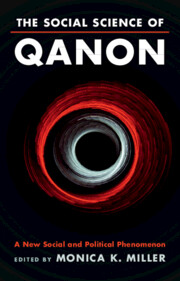Book contents
- The Social Science of QAnon
- The Social Science of QAnon
- Copyright page
- Dedication
- Contents
- Contributors
- Preface
- Part I Introduction to QAnon
- Part II Recruiting and Maintaining Followers
- Chapter 2 Down the Conspiracy Theory Rabbit Hole
- Chapter 3 Psychological Motives of QAnon Followers
- Chapter 4 Cognitive Processes, Biases, and Traits That Fuel QAnon
- Chapter 5 The Role of Moral Cognitions in the Growth of QAnon
- Chapter 6 Emotions and the QAnon Conspiracy Theory
- Chapter 7 Recruitment to QAnon
- Part III QAnon and Society
- Part IV The Role of Communication in Promoting and Limiting QAnon Support
- Part V The Future of QAnon
- Index
- References
Chapter 3 - Psychological Motives of QAnon Followers
from Part II - Recruiting and Maintaining Followers
Published online by Cambridge University Press: 14 September 2023
- The Social Science of QAnon
- The Social Science of QAnon
- Copyright page
- Dedication
- Contents
- Contributors
- Preface
- Part I Introduction to QAnon
- Part II Recruiting and Maintaining Followers
- Chapter 2 Down the Conspiracy Theory Rabbit Hole
- Chapter 3 Psychological Motives of QAnon Followers
- Chapter 4 Cognitive Processes, Biases, and Traits That Fuel QAnon
- Chapter 5 The Role of Moral Cognitions in the Growth of QAnon
- Chapter 6 Emotions and the QAnon Conspiracy Theory
- Chapter 7 Recruitment to QAnon
- Part III QAnon and Society
- Part IV The Role of Communication in Promoting and Limiting QAnon Support
- Part V The Future of QAnon
- Index
- References
Summary
Research suggests that people adopt conspiracy theories in an attempt to satisfy (1) existential (e.g., the need to feel secure and in control), (2) epistemic (e.g., the need to understand the world), and (3) social (e.g., the need to feel positive about one’s self or group) motives (Douglas et al., 2017). In this chapter, we consider the extent to which this framework can explain belief in the QAnon conspiracy theory specifically. QAnon beliefs appear to be driven by existential threats, such as the belief that there is a vast satanic paedophile ring which is being covered up by left-wing Hollywood elites. Regarding epistemic motives, such as the tendency to seek patterns where they do not exist, it becomes understandable why some people might be attracted by cryptic “Q Drops.” Finally, QAnon beliefs are typically right-wing and tend to point the finger towards the left-wing elite for all the alleged wrong-doings. QAnon beliefs, therefore, also appear to be socially motivated. Following the discussion, we outline the similarities and differences between QAnon and other conspiracy theories, and outline ideas for future research.
- Type
- Chapter
- Information
- The Social Science of QAnonA New Social and Political Phenomenon, pp. 33 - 48Publisher: Cambridge University PressPrint publication year: 2023
References
- 1
- Cited by

